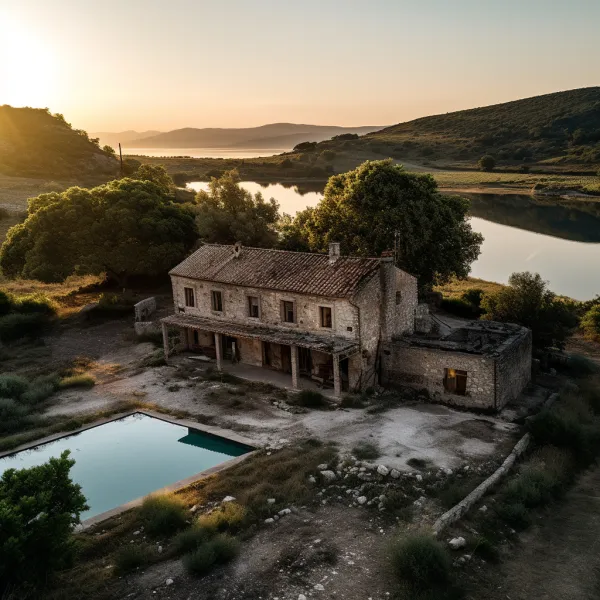Table of Contents:
As we strive to be more intersected with the natural world and proceed for more authentic experiences on our travels, Agrotourism stands out as an appealing option. This article is crafted to guide you through a wonderful voyage of Agrotourism in Croatia, highlighting its mouth-watering tastes, rich traditions, and stunning landscapes. In simpler terms, this is your passport to plunge into a world of pastoral charm and culinary secrets, right from the comfort of your home before you plan your actual journey. Let's embark on the rural charm of Croatia.
Introduction: Exploring Agrotourism
For beginners, Agrotourism or Agricultural tourism refers to the practice of touring rural farming regions to experience and learn about the farm life. It wraps in activities ranging from picking fruits in orchards, wine tasting, to even getting hands dirty in the farm chores. And when it comes to Agrotourism, Croatia stands out with its traditional and organic farming techniques cuddled in dreamy landscapes.
So why should one consider Agrotourism in Croatia? Answer is simple. To immerse into the countryside charm, savour authentic cuisine prepared with locally grown produce, and a chance to step back from the urban hustle, soak in the tranquility and reconnect with nature. Furthermore, you receive a warm welcome from the locals, get to know their remarkable stories, traditions and way of life, all going a little way in contributing to their local economy. Follow along, as we dive deeper into this captivating world.
Agrotourism Croatia: A Window to Tradition and Taste
Croatia, a land of diverse landscapes, is a paradise for Agrotourism enthusiasts. Strolling through its green vineyards, sprawling olive groves, and dense forests, one is enveloped in a serene beauty that's a balm for the city-weary soul. Here, every village has a unique story to tell, presenting an opportunity to travel back in time and gain insights into traditional farming methods and rural way of life.
Without a doubt, the heart of Agrotourism in Croatia lies in its sumptuous taste. The farm-to-table concept here breathes life into the dishes, with fresh fruits, vegetables, and local produce shaping the region's gastronomy. Whether it's savoring the robust olive oils of Istria, the tantalizing truffles of Motovun forest, honey from the beehives of rural farms, or robust wines from the Pelješac vineyards - each bite is a revelation of pure, unfiltered flavours.
Beyond the palate, there's a treasure trove of cultural immersion in store. Indulge in the local festivities, witness the folk dance ‘Kolo’, learn to cook traditional dishes from the Croatian grandmothers, or simply relish the warm hospitality. The tapestry of experiences is diverse and delightful. In essence, Agrotourism in Croatia motivates a clutter-break from the fast-paced world, inviting a dive into the heritage pool of rural life, and enabling one to appreciate the simple pleasures of life.
Exploring Agrotourism: A Pro-Contra Evaluation
| Pros | Cons |
|---|---|
| Allows for a unique, immersive, and personal experience | May require physical exertion which may not be suitable for everyone |
| Supports local economies and traditional farming methods | Depending on the location, it may be difficult to reach due to lack of transportation |
| Provides an opportunity to taste farm-fresh food | Climate and weather conditions may affect the experience |
| Promotes environmentally friendly tourism | Not all farm environments may be comfortable or suitable for all tourists |
Why Choose Agrotourism in Croatia?
Croatia, with its vast expanse of varied landscapes, from sun-kissed coastlines to lush green vineyards, is a mosaic of delightful experiences waiting to be explored. It is a sanctuary for those seeking a break from the mundane, offering myriad experiences which are firmly rooted in nature and tradition. With Agrotourism in Croatia, it's not just about sightseeing. It's about being a part of that beautiful sight, indulging in the very soul of the country, its people, its culture, and its homegrown produce.
When you delve into the world of Croatian Agrotourism, you don't remain an outsider. You become an integral part of an age-old tradition, farming communities, and cultural festivities. You get to understand and appreciate the hard work that goes into producing the delightful Croatian wine you sip or the sumptuous olive oil you drizzle on your salad. The hands-on experiences, coupled with the idyllic settings, make this a wonderful escape from the digital world and an opportunity for families to connect with each other and with nature.
Additionally, Agrotourism in Croatia supports sustainable tourism. By welcoming visitors into their farms and vineyards, the rural community is economically benefited. Whether you choose to stay at a farm, dine at a local-run traditional konoba (tavern), or buy homegrown farm produce, your every action contributes towards the prosperity of the local community. Thus, Agrotourism in Croatia isn't just about enjoyment, it's also about responsibility and sustainability, making it a winning choice for conscious travellers.
Embracing the Magic of Croatian Terrain
Croatia's terrain is a spectacle of nature's diversity, woven into the country's rich tapestry of culture and tradition. Its quaint villages nestled in the rolling hills, dense forests fringing the placid rivers, and the sun-drenched coastline are a sight to behold. The element of Agrotourism in Croatia takes you on a journey of navigating this magical terrain.
Imagine waking up in a rustic farmhouse, surrounded by undulating vineyards. Picture yourself strolling through olive groves, as a gentle breeze whispers stories of an ancient past. From exploring the sunflower fields of Baranja to hiking the lavender routes in Hvar, every path reveals the unique mosaic of Croatia's terrain. This is not just about sight-seeing, but about feeling, experiencing, and living in harmony with nature.
Let's take wine tours as an example - one of the key highlights of Agrotourism in Croatia. A trip to the wine regions like Istria and Dalmatia is not just about wine tasting. It's a sensory voyage through rows of vineyards, understanding the climate and soil, learning the grape varieties, and the art of winemaking. Each vineyard holds its rustic charm, a tale of its terroir, and an invitation to be in the heart of nature.
The boundless beauty of Croatia’s terrain blends seamlessly with the enriching Agrotourist activities, gifting visitors with memories that will linger long after they've returned to the humdrum of city life. In a nutshell, this magic of Croatian terrain captured through Agrotourism is an affair to remember.
Caught up in the Farm-to-Table Charm: Croatia's Agrotourism
In a world increasingly distanced from its food sources, Agrotourism in Croatia bridges the gulf. On a typical agrotourism adventure in Croatia, part of the charm is in following the journey of the produce, from the farmland to your dining table.
The agrotourism ventures here offer you a chance to participate in organic farming practices. You get to witness first-hand, the cultivation methods, the harvesting process, and most intriguingly, how these freshly harvested ingredients get masterfully transformed into simple yet heavenly dishes. Whether it be fresh hand-picked asparagus, homemade cheese from the local dairy, or extra virgin olive oils, the experience is rich and intimate.
Here, meals hold a deeper meaning than just satiating hunger. It's about relishing food that is grown organically, on a very land that sheltered you during your farm stay. The pleasure of dining out in the open air, amidst the scenic views, while savouring a meal of fresh farm produce, is a feeling beyond words, making this journey, a gastronomical delight!
Apart from food, Farm tours in Croatia allow you to engage in a plethora of activities. From learning about beekeeping and honey production to partaking in grape harvest and wine production - each activity is a doorway to a world rooted in nature’s magic. The authenticity and soulfulness of the Croatian countryside are bound to leave you charmed!
Experiences Worth Savoring: Agrotourism Croatia
As you step into the world of Agrotourism in Croatia, you unravel experiences that are embedded in the native landscapes and are rich with the flavours of tradition. Each region unfolds with its unique agricultural produce, specialty dishes, and warm-hearted people, ready to share their authentic lifestyle with you.
If you're a wine enthusiast, visiting vineyards in the Dalmatian Hinterland or on the Istrian Peninsula will give you the unique opportunity to sample a range of locally produced wines. Picture yourself strolling through the vineyards, absorbing the process, taking part in harvesting grapes, and gaining insight into the wine-making tradition, all followed by a delightful wine-tasting session.
For a gastronomic adventure, engaging in a cooking class, guided by the experts - the local babas (grandmothers), is a must-do. From making the traditional Peka or learning the secrets of crafting the finest homemade pasta, these experiences promise a feast, both for your palate and soul. Each region of Croatia boasts its distinct flavor profile, promising an explosion of tastes in every bite.
Visualize yourself amid the olive groves, taking part in the annual olive harvest in Istria and Dalmatia. The rhythmic rally of collecting olives, the rush of processing it into the gold liquid, followed by a tasting session of this treasured Croatian olive oil, promises an unforgettable chapter in your agrotourism journey.
Planning a truffle hunting expedition in the misty Motovun Forest of Istria will allow for an enchanting experience. Guided by trained dogs and experienced locals, the exciting search for these gastronomic gems ends with a scrumptious meal, featuring the very truffles you hunted down.
These uniquely immersive experiences remind us how Agrotourism can deliver genuine and rewarding encounters, allowing us to appreciate the subtle rhythms of the land and its indigenous way of life.
Conclusion: Agrotourism, Forging a Stronger Connection with our Roots
The journey of Agrotourism in Croatia weaves a magical tapestry of authentic experiences that are grounded in tradition, taste, and terroir. As we tread these path less travelled, savor regional flavors, and witness the rhythm of rural life, we establish an intimate connection with our roots and the very essence of humanity. This is what Agrotourism in Croatia achieves - it bridges the gap between us, our food source and the hardworking farming community.
Moreover, it redefines vacationing by adding layers of learning, culture, and sustainability to it. It serves as an eye-opener to a way of life that’s slower, purer, and closer to nature. In essence, Agrotourism in Croatia stands as a testament to a simpler era, encouraging modern travelers to experience that simplicity, if only for a few soul-stirring days. In conclusion, if we are to understand our past, appreciate our present and refine our future, journeying into the hearty world of Agrotourism is a path that's worth treading.
Discover Agrotourism: Taste, Tradition, and Terrain
What is Agrotourism?
Agrotourism, or agritourism, is a type of tourism that encourages visitors to experience rural life, traditional agriculture, and local food and drink specialties, often through stays on farms or vineyards.
How can one Immerse in Agrotourism?
One can immerse in agrotourism by visiting rural locales, engaging in farm activities, tasting locally grown products, experiencing local traditions and understanding the terrain of the region.
Why is Agrotourism gaining popularity?
Agrotourism is gaining popularity due to the unique authentic experiences it offers. It allows tourists to connect with nature, understand where their food comes from and experience rural traditions.
What can one learn from Agrotourism?
From Agrotourism, one can learn about sustainable agriculture, local culture and traditions, cooking with fresh farm products and also the importance of supporting local communities and farmers.
Can Agrotourism be beneficial to local communities?
Yes, agrotourism can be highly beneficial for local communities. It can provide a source of additional income for farmers, foster local economic growth, promote the conservation of agriculture and traditions, and strengthen community connections.



